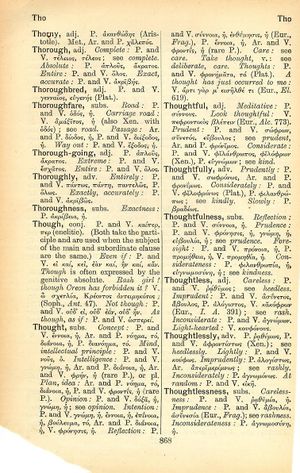though: Difference between revisions
From LSJ
εἰ πλείονα δ' εἰδείης Σισύφου → if you were more intelligent than Sisyphus
(CSV5) |
m (Woodhouse1 replacement) |
||
| Line 1: | Line 1: | ||
{{Woodhouse1 | {{Woodhouse1 | ||
|Text=[[File:woodhouse_868.jpg|thumb|link={{filepath:woodhouse_868.jpg}}]] | |Text=[[File:woodhouse_868.jpg|thumb|link={{filepath:woodhouse_868.jpg}}]] | ||
===conjunction=== | |||
P. and V. [[καίπερ]], περ (enclitic). | [[prose|P.]] and [[verse|V.]] [[καίπερ]], [[περ]] (enclitic). | ||
(Both take the participle and are used when the subject of the main and subordinate clause are the same.) | (Both take the participle and are used when the subject of the main and subordinate clause are the same.) [[even if]]: [[prose|P.]] and [[verse|V.]] [[εἰ καί]], [[κεἰ]], [[ἐὰν καί]], [[ἢν καί]], [[κἄν]]. | ||
[[though]] is often expressed by the genitive absolute. [[rash girl! though Creon has forbidden it]]? [[verse|V.]] [[ὦ σχετλία]], [[Κρέοντος ἀντειρηκότος]]; ([[Sophocles|Soph.]], ''[[Antigone]]'' 47). | |||
[[not though]]: [[prose|P.]] and [[verse|V.]] [[οὐδ]]' εἰ, [[οὐδ' ἐάν]], [[οὐδ]]' ἤν. | |||
[[as though]], [[as if]]: [[prose|P.]] and [[verse|V.]] [[ὡσπερεί]]. | |||
}} | }} | ||
Revision as of 08:51, 20 May 2020
English > Greek (Woodhouse)
conjunction
P. and V. καίπερ, περ (enclitic).
(Both take the participle and are used when the subject of the main and subordinate clause are the same.) even if: P. and V. εἰ καί, κεἰ, ἐὰν καί, ἢν καί, κἄν.
though is often expressed by the genitive absolute. rash girl! though Creon has forbidden it? V. ὦ σχετλία, Κρέοντος ἀντειρηκότος; (Soph., Antigone 47).

